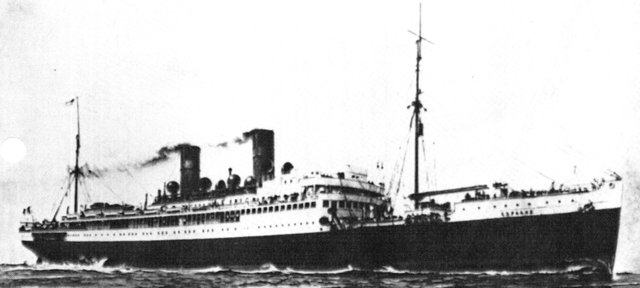To continue with Lester Johnson’s story, a week after the first newspaper announcement, the Kinsley Mercury reported:
“P. H. Johnson received a telegram Sunday from his son, Lester Johnson, saying he was sailing that day at 3:30 with a party of medical students on the steamship Rochambeau for France, where they will serve in the ambulance corps of the French army for an enlistment period of six months. The ship is sailing by way of Brazil to avoid the more dangerous submarine districts.”
Because the United States was not in the war, and Lester was going to France as a volunteer and not in the military, he did require a passport. We found a copy of Lester’s application in a book of passport applications up to the year 1925 that was compiled by Ed Carlson, our go-to-historian on Kinsley and Edwards County.
Lester’s passport verified that Edward’s father had emigrated from Denmark to the United States in 1870. Lester was going to France for “Service in the American Ambulance corps,” leaving from New York, sailing on board the Rochambeau on February 3, 1917 (ship pictured below).
Lester is described as 23 years old, 5’ 4” tall with a high forehead, blue eyes, straight nose, medium mouth, round chin, brown hair, fair complexion and round face. It states that he was engaged in hospital work.
Unluckily for Lester, On February 1, Germany returned to a policy of unrestricted submarine warfare that it had previously suspended in September, 1915 in response to pressure from the United States and other neutral countries.
You may recall that early in 1915, Germany declared the area around the British Isles a war zone, in which all merchant ships, including those from neutral countries, would be attacked by the German navy. After several attacks, the Lusitania was sunk by a German U-boat on May 7, 1915. The Lusitania was a British passenger ship, and 1,201 people drowned including 128 Americans. The Germans cited that the Lusitania was carrying a supply of munitions to justify the attack. U.S. President Woodrow Wilson demanded an end to German attacks against unarmed merchant ships, and by September, 1915, the German navy was persuaded to suspend U-boat warfare altogether. But the German army and navy ultimately convinced Kaiser Wilhelm that the U-boat was essential for the war strategy and victory, and it was reinstated on February 1, 1917.
The next post will be Lester’s own words in the form of a letter written aboard the Rochambeau and published in the March 8, 1917 edition of the Kinsley Graphic.

